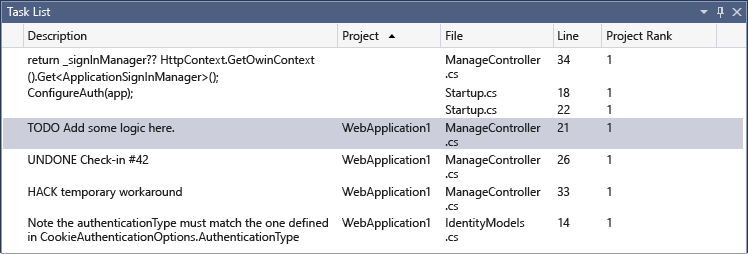Use the Task List
Applies to: ![]() Visual Studio
Visual Studio ![]() Visual Studio for Mac
Visual Studio for Mac
Note
This article applies to Visual Studio 2017. If you're looking for the latest Visual Studio documentation, see Visual Studio documentation. We recommend upgrading to the latest version of Visual Studio. Download it here
Use Task List to track code comments that use tokens such as TODO and HACK, or custom tokens, and to manage shortcuts that take you directly to a predefined location in code. Click on the item in the list to go to its location in the source code.
Note
This topic applies to Visual Studio on Windows. For Visual Studio for Mac, see Task comments (Visual Studio for Mac).
The Task List window
When Task List is open, it appears at the bottom of the application window.
To open Task List, select View > Task List, or from the keyboard press Ctrl+\,T.

To change the sort order of the list, select the header of any column. To further refine your search results, press Shift and click a second column header. Alternatively, on the shortcut menu, choose Sort by, and then choose a header. To further refine your search results, press Shift and choose a second header.
To show or hide columns, on the shortcut menu, choose Show Columns. Select the columns that you want to show or hide.
To change the order of the columns, drag any column header to the location that you want.
User tasks
The user task feature was removed in Visual Studio 2015. When you open a solution that has user task data from Visual Studio 2013 and earlier, the user task data in your .suo file is not affected, but the user tasks are not displayed in the task list.
If you wish to continue to access and update your user task data, open the project in Visual Studio 2013 and copy the content of any user tasks into your preferred project management tool (such as Team Foundation Server).
Tokens and comments
A comment in your code preceded by a comment marker and a predefined token also appears in Task List. For example, the following C# comment has three distinct parts:
The comment marker (
//)The token, for example (
TODO)The comment (the rest of the text)
// TODO: Load state from previously suspended application
Because TODO is a predefined token, this comment appears as a TODO task in the list.
Custom tokens
By default, Visual Studio includes the following tokens: HACK, TODO, UNDONE, and UnresolvedMergeConflict. They are not case-sensitive. You can also create your own custom tokens.
Note
Default tokens are available only for the C/C++, C#, and VB languages. To create your own tokens for other programming languages, use the following steps.
To create a custom token:
On the Tools menu, choose Options.
Open the Environment folder and then choose Task List.
The Task List options page is displayed.

In the Name text box, enter your token name, for example BUG.
In the Priority drop-down list, choose a default priority for the new token.
Choose Add.
Tip
The Add button becomes enabled after you enter a name. You must enter a name before clicking Add.
C++ TODO comments
By default, C++ TODO comments are displayed in Task List.
To turn off C++ TODO comments, on the Tools menu, choose Options > Text Editor > C/C++ > View > Enumerate Comment Tasks, and set the value to false.
Shortcuts
A shortcut is a bookmark in the code that is tracked in Task List. It has a different icon than a regular bookmark. Double-click the shortcut in Task List to go to the corresponding location in the code.

Create a shortcut
To create a shortcut, insert the pointer into the code where you want to place a shortcut. Choose Edit > Bookmarks > Add Task List Shortcut or press Ctrl+K, Ctrl+H.
To navigate through the shortcuts in the code, choose a shortcut in the list, and then choose Next Task or Previous Task from the shortcut menu.